Like other television hosts, Lilly Singh was forced to shift her programming to a format that didn’t include a live studio audience and in-person interviews once COVID-19 restrictions took over. But unlike her peers — the majority of whom are cisgender straight white men in their 40s and 50s — Singh, a bisexual brown woman in her 30s, has taken the opportunity for change and truly made it her own. And the difference is palpable. Whether she’s chatting with actor Rainn Wilson about his pair of pet pigs or jokingly deciphering the differences between herself and teenage inventor and scientist Gitanjali Rao, she is relaxed, confident and decidedly in control.
“When I look at myself in season one, it reminds me of ‘first YouTube video Lilly,’” Singh says over the phone from her production “house” in Los Angeles, recalling her foray into the world of entertainment over 10 years ago. “She was someone who was trying to figure it out and find her voice.”
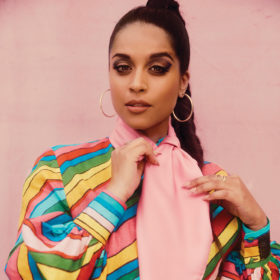
When contemplating the debut version of her NBC show, A Little Late With Lilly Singh, which launched in 2019, Singh says she feels it wasn’t truly reflective of her naturally gregarious self. In addition to having to learn the ropes of producing a network TV show and adhere to the medium’s formulaic approach, Singh must have felt the pressure of simply being the first woman of colour to host a post-11 p.m. major-network chat show. Something had to give, and in one case it very literally did.
Singh has now noticeably abandoned the trim tailored suits she wore throughout the first season; that former style decision was a self-imposed misstep, she says. “I wanted to look like a boss,” she laughs, noting that the silhouettes didn’t lend well to her exaggerated personality and penchant for occasionally busting out dance moves. The looks were indeed in contrast to the oversized pieces Singh has always favoured, even in pre-COVID days.
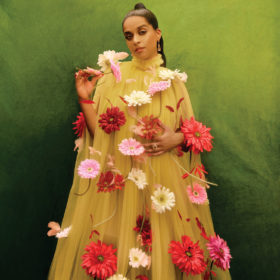
right), $11,720, Kallati. Ring (on left), $2,800, Anabela Chan.
When asked about her preference for wearing sweatsuits, sneakers and outsized suiting — pieces that for decades have been branded as “masculine” — Singh makes an interesting comparison. “I see this idea as being parallel to my experience of coming out and having grown up in Indian culture,” she says, referring to the moment two years ago when she revealed that she is bisexual. “The clothes are very gendered, and there was no such thing as androgynous Indian clothing back then.” Noting that the pieces she was expected to wear as a kid were uncomfortably heavy due to their embellishments and that she was a “tomboy” back in the day, Singh says that her current opinion of style is one in which a sense of ease is the guiding principle. “I believe that what you wear should bring out the best in you,” she explains. Drawn to the statement pieces of designer Kanika Goyal and the brand NorBlack NorWhite, Singh adds that her reluctance to play the Hollywood game and her determination to stay true to her laid-back personal taste have grown even stronger thanks to the uncompromising attitude of a few of her contemporaries.
“I love that Billie Eilish wears oversized clothing because she doesn’t want people commenting on her body,” she says. “It’s something that I really relate to, and I count my blessings twice that she’s made it cool. And Zendaya has inspired me to break the rules. I was beside her at an event one time and she was wearing a blazer with huge shoulder pads that were, like, six times her size, and I remember thinking ‘You’re so friggin’ cool.’ These are people who say ‘I see your norms, I see what other people are doing — and I’m going to do me.’”
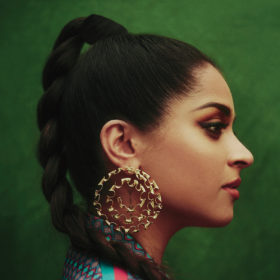
It’s this idea of authenticity that has ultimately given Singh a greater sense of satisfaction in her work as well. “I can genuinely say that in season two, I have brought my full self to set every day,” she says. From softening her wardrobe to offering behind-the-scenes glimpses of what it’s like running a show during the pandemic, Singh and her candour have been the key to unlocking A Little Late’s full potential. “I’m way more me,” she notes of the show’s present vibe. “I’m having more fun, and I think you can see that through the screen.”
After all, an air of unselfconscious openness is what endeared Singh to her fans in the first place. Her YouTube segments, built on the exploration of contemporary life and her ancestry and culture, often boast purposely stereotypical characters, like a hapless uncle and a rigidly traditional mother figure. She has also portrayed Vice President Kamala Harris in several newer sketches — most notably in one that parodies the notion of “success” through the lens of a conservative Indian family; her oeuvre is also heavily informed by her childhood spent in the multicultural atmosphere of the Toronto suburb of Scarborough. These jocular interpretations quickly took off, appealing to a community of fans who felt left out of mainstream comedy’s topics of importance — that is, things that cis white people found funny.
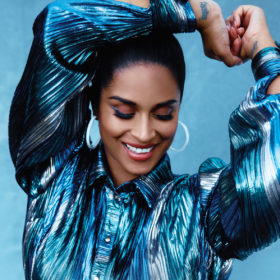
“One of the reasons I wanted to get into late-night was because I didn’t think there was anyone who had my perspective,” says Singh. “I didn’t grow up watching it because my parents never watched it. They never understood the jokes, and they never related to the point of view.”
For her part, Singh sees her visibility and platform as an opportunity to pursue connectivity, inclusion and personal growth. “As I’ve grown older, I have learned the power of conversation,” she says. “I grew up in a culture where it wasn’t encouraged. I was critiqued as a kid: ‘Don’t be so loud; don’t be so outspoken.’ I wanted to be the centre of attention at parties but was discouraged from doing so. It resulted in me having a lot of inner turmoil and baggage. If I had an issue with something — someone bullying me at school, for example — I never had the tools to deal with it. It wasn’t until I discovered YouTube and the entertainment industry and social media that I found out that having conversations is a really great way to heal and learn about yourself.”
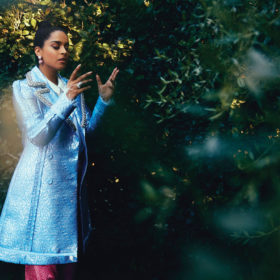
Yet Singh has also found the value of introspection and separation from the internet. She made news when she went on a “social media detox” several years ago, and it’s something she continues to do as much as possible to preserve her mental health. While admitting that she has the occasional “rabbit hole” relapse on Twitter — and that the duties of her job involve promoting episodes on social media channels — she says that removing herself from the internet’s toxic pool of discourse is essential for maintaining a sense of clarity. “One of the hardest parts — and I want to preface this by saying that it’s a hella first-world problem — has been the normalization of dehumanizing me,” Singh says of her success and the scrutiny that comes with it. “That has been a very strange thing to experience. As my profile has gotten bigger, it has become apparent to me that it’s normal for people to treat me like I’m someone who doesn’t have feelings or doesn’t deserve privacy. There have been many instances where things have been posted that would impact my safety and my well-being. It’s something I’ve had to come to terms with, but it’s not an easy thing at all.”
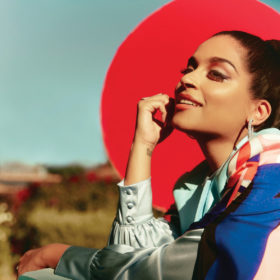
But there have been moments when Singh felt the need to extend personal information in a public space, such as when she shared that she’s bi. The announcement was heartening to fellow POC members of the queer community and was an opportunity for her to “take back control” in an atmosphere where anyone feels at liberty to insert themselves into another person’s narrative. “I don’t want people who have never met me to tell me who I am,” she says.
And Singh continues to channel this singular spirit in every aspect of her life. “Somewhere in the past six months, I became exhausted about putting on any type of facade,” she says. “That’s not to say that anything I did before was fake, per se — I just always caved to the pressure of doing what I thought people expected of me. I was so focused on making everyone else proud that I ignored what makes me proud and what my expectations are. Now, in everything I do, I want to be proud of myself and have fun; my expectation is to be myself. That’s the Lilly everyone is going to get now.”
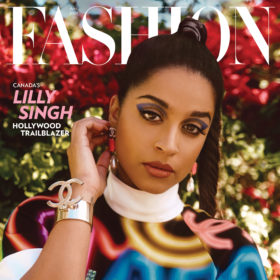
Photography by AUSTIN HARGRAVE. Styling by DESIREE MORALES. Creative direction by GEORGE ANTONOPOULOS. Hair by RENÉ CORTEZ. Makeup by ASHLEY JOY BECK FOR MISMACK, SMASHBOX, ALGENIST AND LIP LUFFA. Fashion assistant: ALEJANDRA HARNISH.
The post The Real Lilly Singh Has Arrived — and She’s Ready To Talk appeared first on FASHION Magazine.
from FASHION Magazine https://ift.tt/3vpVwqd
via babu31blog
No comments:
Post a Comment